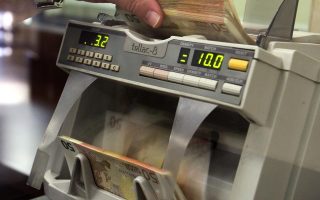Shadow economy costs the state 16 bln euros a year

On average, Greeks spend more than 750 euros per year on undeclared products and services, while self-employed and freelance professionals tend to spend more than that. The result is that even though Greece has been in recession for six years, the underground economy accounts for around 40 billion euros a year, depriving the state coffers of 16 billion euros in taxes and social security contributions.
However, studies have also found that the recession in the real economy is also reflected in the shadow economy. In 2010, the shadow economy represented 25.4 percent of gross domestic product, slipping to 23.6 percent of GDP four years later. In absolute numbers, this means that it has shrunk by at least 20 billion euros since the start of the crisis, as in 2010 it was estimated at 56-60 billion euros while today it’s around 40 billion euros. Experts attribute this drop to the difficulty in getting hold of large amounts of cash, the shadow economy’s lifeline.
While there are no estimates based on 2015 data, it is thought that the underground economy has continued contracting. Sure, tax hikes, unemployment and the huge (for a European country) number of self-employed professionals have contributed to widespread tax evasion and boosted the shadow economy, but the capital controls imposed in the summer of 2015 and the shortage of cash have crimped business in the parallel economy.
So what is that 23-25 percent of GDP the experts believe the underground economy represents spent on? Researchers focus on illegal purchases of legal goods and services rather than illegal ones, meaning that the illegal trade in tobacco products, fuel, alcohol and knock-offs, for example, is part of the shadow economy, whereas illegal narcotics are not.
What having such a big underground economy means can be seen from a simple calculation: Total taxation comes to 40 percent of GDP. Therefore, if the shadow economy comes to roughly 24-25 percent of GDP per year, the state is missing out on revenues of around 9-10 percent of GDP, or some 16 billion euros a year.
This rate of 24-25 percent is among the highest in Europe, topped only by Bulgaria (31 percent), Croatia, Romania, Lithuania and Estonia (28 percent), Turkey (27 percent) and Latvia (26 percent).
The reasons why it is so high are analytically recorded in a study on the Greek underground economy conducted as part of the Thales interdisciplinary research program, co-financed by the European Union and the National Strategic Reference Framework (NSRF or ESPA).
The study, which was supervised by Macedonia University assistant professor Aristidis Bitzenis, lists the following as the key causes:
1. The huge spike in direct and indirect taxes and in the ratio by which social security contributions are calculated. The value-added tax of 24 percent is among the three highest in Europe. At 45,000 euros, Greece has the lowest income level carrying the highest rate of tax (up to 55 percent when including the Solidarity Tax), while the percentage paid in employers’ and workers’ social security payments is among the three highest in Europe.
2. Unemployment. Numerous studies show a direct correlation between joblessness and the growth of the shadow economy, and Greece tops Europe’s unemployment charts right now. According to data drawn from the Eurobarometer, unemployed Greeks spend 789 euros on average on undeclared goods and services, compared with 439 euros among salaried workers.
3. The percentage of the entire work force made up of self-employed professionals. Companies employing up to nine people represent 96 percent of the total number of registered businesses in Greece and 55 percent of all employees, while in Europe this average comes to below 30 percent. Self-employed professionals make up 32 percent of the work force, compared to the European Union average of 14 percent. Self-employed professionals, meanwhile, are estimated to spend 950 euros per year in the shadow economy, far above the national average of 750 euros.
4. Red tape.
5. The tax ethic, described by Vasileios Vlachos of Macedonia University’s Observatory of the Shadow Economy as the inclination of citizens to make good on their tax obligations through a combination of different factors, such as personal gains arising from tax and contribution evasion and peer pressure.
Practices
The Macedonia University study, which was submitted to Giorgos Katrougalos before he was removed from the Labor Ministry during a recent cabinet reshuffle, also lists everyday practices that affect public revenues. Undeclared income, for example, comes to 1,268 euros on average per Greek, with men collecting 1,941 euros per year and women 778 euros. Undeclared income among the self-employed is estimated at 5,000 euros per year, much higher than the 1,000 average for salaried workers. Greeks over the age of 55 are more inclined not to declare income (at an average of 2,909 euros), while young people under the age of 24 get away with 754 euros per year.
The report calls for immediate measures to restrict the shadow economy. It calls for a stable tax regime, fairer laws regarding tax evasion so that dodgers are not treated equally to debtors, and an increase in audits and inspections. It also recommends prohibiting individuals and businesses convicted of tax fraud from participating in state contract tenders and subsidy programs.





